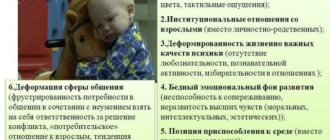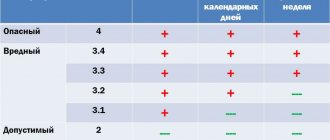What qualifies as deliberate deterioration of conditions?
Not all acts qualify as a deliberate change for the worse in living conditions. In particular, these include the following actions:
- registration of a child with one of his parents, which follows from Art. 20 of the Civil Code of the Russian Federation, which presupposes that a minor is required to have a residence permit at the residence address of his father or mother. The appearance of a newborn in a family cannot be a malicious deterioration;
- registration in the premises of a new family member due to marriage or other relatives, for example, the owner’s parents;
- temporary registration at your own address, both relatives and third parties;
- the refusal of the donee to refuse a gift, which is living space, or the refusal of the donor directly to fulfill the gift agreement concluded by him;
- recognition of the transaction as not complying with the law by a court decision;
- cancellation of the rental agreement and return of the property.
Since such actions are not a deliberate deterioration of living conditions, a citizen, if there are appropriate grounds, the list of which is given in Art. 51 of the Housing Code of the Russian Federation, can join the housing queue and receive the square meters due to him.
We remind you that even if you thoroughly study all the data that is in the public domain, this will not replace the experience of professional lawyers! To get a detailed free consultation and resolve your issue as reliably as possible, contact specialists through the online form.
What events are generally accepted as deteriorating living conditions, and how are legal relations in the housing sector regulated? The Housing Code of Russia dated December 29, 2004 No. 188-FZ defines only the consequences of intentional deterioration by citizens of their living conditions - Art. 53 Housing Code of the Russian Federation.
This article does not provide an exhaustive explanation of this phenomenon, therefore, in the housing sector there are also various by-laws that define in more detail what actions of citizens should be considered intentional.
In general, the actions that led to the deterioration of living conditions are several generally accepted facts:
- transactions of purchase and sale, exchange, donation, allocation of shares, changes in property rights of owners, etc.;
- fictitious divorce;
- settlement of a minor child, parents or other relatives who previously lived were registered at a different address on the territory of Russia;
- registration at the place of residence, if the citizen was not previously registered for additional living space;
- leaving the housing cooperative in order to obtain a share;
- converting residential premises or part thereof into non-residential premises;
- failure to comply with the requirements of the contract for the use of living space, which was followed by the forced eviction of the citizen.
And this is not a complete list, which can be expanded and clarified by departmental regulations.
Example
A rather interesting point in the housing issue is the provision of living space for military personnel, regulated by the Order of the Minister of Defense of the Russian Federation
dated September 30, 2010 No. 1280 “On the provision of residential premises to military personnel of the Armed Forces of the Russian Federation under a social tenancy agreement and office residential premises”
. There are also various cases of deliberate deterioration of living conditions by military personnel.
Customer Reviews
Gratitude from Potapova T.I. I express my gratitude to Denis Yuryevich Stepanov for the work done, high qualifications, as well as for very clear, accessible help in solving my problem (protection of consumer rights). Excellent, very competent lawyer. Thank you very much!
Sincerely, Potapova Tamara Ivanovna, 07/09/2019
Thanks to A.I. Ivanov I would like to express my gratitude to the team of the “Legal Agency of St. Petersburg”, and especially to Artem Igorevich Ivanov, for the competent actions and decision in my civil case. I dare say that this is one of the best law firms in the city, because... I became very close to the lawyers. Everything is done in a timely manner and to the point. Good luck to the team in everything.
Sincerely, Nadezhdin A.N. June 7, 2018
From Pravikovskaya N.B. I express my gratitude to the staff of the legal consultation: Andrei Valerievich and Dmitry Konstantinovich, who helped me resolve the unpleasant situation with the Pyaterochka store.
The issue was resolved in my favor without delay and quickly. They apologized to me and I received monetary compensation, all without lengthy litigation. Once again, thank you very much!
Review by Gavrichkova A.N. I would like to express my deepest gratitude to Yuri Vladimirovich Sukhovarov for his humane attitude towards my problem and detailed professional advice on solving it. I wish I could meet such people in my life more often.
Sincerely, Gavrichkov Alexander Nikolaevich.
Review by Marcheilo I.V. On September 24, 2021, I turned to Konstantin Vasilievich for legal advice. I would like to express my gratitude for your sensitive, attentive attitude and qualified assistance. I received a comprehensive answer to all my questions. They helped a lot. Thank you! Sincerely, Marcheilo Irina Vladimirovna.
Review by Irina D. I thank the Legal Agency of St. Petersburg for the warm, sincere welcome and the detailed, competent, thorough, conscientious legal position of lawyer Andrei Valerievich.
Thanks to Pavlyuchenko A.V. from Sonets V.V. I express my deepest gratitude to Alexander Viktorovich Pavlyuchenko for the consultation and competent approach to the matter, as well as the successful outcome in my problem. I also want to express my gratitude for your kindness. I wish you success in this work that is necessary for us.
Sincerely, Sonets V.V. 05/17/2018
Letter of gratitude to Ermakov A.V.
Gratitude from Kikkas V.P. Kikkas V.P. I am grateful to the Legal Agency of St. Petersburg for understanding the situation and timely assistance in my seemingly hopeless situation, personally to Denis Yuryevich Stepanov, I hope to continue to cooperate.
Kikkas V.P. 08.11.2018
Review by Rychnikova G.V. I express my gratitude to your employee Andrey Valerievich Ermakov for providing me with legal assistance.
I also express my gratitude to Diana Sumarokova for her polite and tactful customer service and the very pleasant atmosphere in your office.
What actions might fall into this category?
Deterioration of living conditions is:
- Personal account section;
- Reduction of living space as a result of exchange;
- Failure to comply with the provisions of the residential lease agreement, as a result of which government authorities were forced to resort to judicial eviction. For example, failure to pay the due rent for six months may result in eviction to another, less comfortable premises;
- Registration of additional residents upon marriage or divorce, which is considered sufficient grounds for inclusion in this category;
- Carrying out various operations with shares of residential premises: allocation, determination, change;
- Sale (transfer) of the entire residential premises or any shares thereof according to the transaction;
- Refusal to use existing residential premises in accordance with the social tenancy agreement.
Consequently, we are talking about certain actions, as a result of which there is a need for the participation of government bodies in providing the citizen with other housing.
Article 53 of the Housing Code of the Russian Federation deals with the deliberate deterioration of living conditions. Its essence lies in the fact that if citizens, seeking to register in order to obtain living space, take certain actions that are unlawful from the point of view of the code, then they are deprived of the right to make such attempts for five whole years.
We invite you to read: What is the compensation for harmful working conditions at the enterprise: 2021, Labor Code of the Russian Federation, the procedure for additional payment
The problem with this article, and, accordingly, with those citizens whose housing situation somehow falls under its provisions, is that there is no clear interpretation of what is considered intentional deterioration. Otherwise, even the birth of a child or one spouse moving into the living space of the other after marriage may be classified as a deliberate deterioration of living conditions.
Court decisions
Apartment disputes: eviction of a family member
Unwanted neighbor: how to defend your rights to an apartment?
My housing: what to do if they try to kick you out of your apartment
How to protect property rights after divorce
The apartment does not meet sanitary requirements
On your own rake: what nuances should not be forgotten when it comes to the housing issue
What actions do not constitute a deterioration of living conditions?
Actions that are not deterioration of living conditions do not include:
- Moving minor children to the place of residence of either parent;
- Move-in of a spouse, parents, and other categories of citizens who are within a certain degree of relationship, subject to the norms established by law;
- Legal operations to terminate the annuity agreement at the initiative of the recipient;
- Refusal to accept a gift by the donee, refusal of the donor to fulfill the gift agreement;
- If the court recognizes the transaction with residential premises as invalid.
Intentional deterioration of living conditions
The articles of the Housing Code of the Russian Federation establish that citizens are given the right to move into the category of low-income people in order to get on the waiting list for housing. In turn, the state undertakes to comply only with the legitimate demands of the applicants. So, for example, sometimes a contradiction arises when an individual had no claims regarding the expansion of living space, as a result of which the standards for square meters became lower than they were. The contradiction lies in the fact that there is no unlawful context here, since during the period of the applicant’s actions, he had not yet been registered.
In connection with the current circumstances, such a concept as the deliberate deterioration of housing conditions arose, which received a legal basis after the new Housing Code of the Russian Federation came into force in 2005. Thanks to changes in its articles, today it is possible to refer to certain points that clarify which actions are considered intentional.
Living conditions of military personnel
Many questions and discrepancies arise when interpreting legislative norms and legal provisions regarding housing issues relating to such a significant category of citizens as military personnel.
What can be attributed to the deliberate deterioration of the living conditions of military personnel? In accordance with the Instruction “On the provision of service living quarters to military personnel - citizens of the Russian Federation, serving under a contract in the Armed Forces of the Russian Federation,” a serviceman is deprived of the right to register as a person in need of housing if certain actions are taken.
These steps include the following:
- Intentional change in the order of use of residential premises;
- Exchange;
- Failure to comply with the agreed terms of the social rental agreement;
- Divorce in which there was an allocation of shares of the residential premises;
- Alienation of parts or the entire residential premises, resulting in a violation (downward) of the accounting norm regarding the number of square meters that should fall on each member of a military member’s family.
Alienation includes the following actions:
- Voluntary transfer of living space from one owner to another as a result of donation;
- Purchase and sale transactions.
If such precedents arise, the right to improve housing conditions should be deprived for a period of 5 years. Only after this period has expired does the serviceman have the right to re-apply for improvement of living conditions.
As for military personnel, the provision of social housing to them is carried out on the basis of Order of the Ministry of Defense No. 1280 of September 30, 2010.
Clause 4 of this regulatory document states that a deliberate adjustment for the worse in living conditions may occur as a result of the commission by a person undergoing military service of certain actions, which may result in a significant reduction in living space.
Some military personnel quite deliberately agree to such a reduction. For example, they can make any transaction, the result of which will be the alienation of all housing or only its share.
In addition, deliberate deterioration may occur as a result of a change in the procedure for using housing, which may be expressed in non-payment of housing and communal services.
Also, if the actions of a serviceman lead to damage to the living space, as a result it ceases to meet technical and sanitary standards.
We invite you to read: Rules for taking maternity leave
The fact of deliberate deterioration will also be revealed if the officer enters into a fictitious marriage to obtain additional square meters, or, conversely, in the event of a divorce, allocates a share of the occupied housing to the ex-spouse.
As in the case of other citizens, the actions of a military serviceman to worsen living conditions cannot be considered intentional if at the time of their commission he was already included in the register as an applicant for social housing.
Order No. 1280 contains a detailed list of actions that do not fall under the deliberate adjustment of conditions for the worse, these include:
- obtaining registration in the home of a military man for his wife, minor child, parents, dependents in cases where the mentioned persons did not have their own home before moving in, including in use. If such premises existed, then they should be officially recognized as unsuitable for living in. Also if a person is discharged from his place of residence due to marriage with a military man and further movement with his spouse to the place of service. A citizen was deregistered at his place of residence due to his parent moving to his place of service;
- cancellation of a rental contract with a military personnel;
- declaration of a housing transaction as invalid by a court decision;
- vacating occupied living space by a military personnel due to moving to serve in another area.
Arbitrage practice
Due to the fact that there is no strict regulation of actions and procedures, each court considers the application individually and is guided by current practice, explanations of higher authorities, as well as local legislation. This means that in each individual case the result can vary significantly. A couple of examples from judicial practice:
Example No. 1: A plaintiff has applied to the court and demands that he be registered as in need of improved housing conditions. Based on the claim, the applicant has already been repeatedly denied this, although the sanitary and hygienic conditions in his housing do not meet the standards. Having examined the case materials, the court found that the refusals were for a good reason: the applicant had another home, but he deliberately sold it in order to declare with good reason that the conditions in the apartment in which he lives did not correspond to this. Taking into account the current situation, the court rejected the claim on the basis of Article 53 of the RF Housing Code.
Example No. 2: A plaintiff has applied to the court and demands to be registered as a person in need of improved housing conditions. According to the application, he had already applied several times, but was always rejected on the grounds that he himself sold his own apartment, which was a deliberate act. The plaintiff notes that he actually sold his apartment, but did so not of his own free will, but by a court decision obtained as a result of a divorce from his ex-wife. In that situation, the court ruled that the plaintiff was obliged to sell the apartment and transfer the entire amount to his wife, and in return he would have other property: a car and a dacha. The plaintiff notes that the dacha is not suitable for living in the cold season. Having studied the case materials, the court granted the applicant’s claim and issued him a decision on the basis of which he could register. It should be noted that this situation could be considered in another way: such a divorce could be recognized as fictitious and in this case the claim would be refused.
Due to the poor development of legislation in the field of deliberate deterioration of housing conditions, most often it is extremely difficult or absolutely impossible to achieve the desired solution without the help of an experienced lawyer. At a free consultation, experienced lawyers will talk about the main features that need to be taken into account. They can also represent the client’s interests both when trying to register and when going to court.
FREE CONSULTATIONS are available for you! If you want to solve exactly your problem, then
:
- describe your situation to a lawyer in an online chat;
- write a question in the form below;
- call Moscow and Moscow region
- call St. Petersburg and region
Save or share the link on social networks
(
1 ratings, average: 5.00 out of 5)
Author of the article
Natalya Fomicheva
Website expert lawyer. 10 years of experience. Inheritance matters. Family disputes. Housing and land law.
Ask a question Author's rating
Articles written
513
- FREE for a lawyer!
Write your question, our lawyer will prepare an answer for FREE and call you back in 5 minutes.
By submitting data you agree to the Consent to PD processing, PD Processing Policy and User Agreement
Useful information on the topic
Intentional actions and their consequences
The law defines punishment for citizens who, through their voluntary actions, worsen their living conditions, in the form of refusal for a period of five years to register with local authorities as persons in need of additional living space. It is also possible to be held accountable (administrative, criminal) for fraud with government social support measures.
However, determining the fact of intentionality of actions in the case of registration with local authorities in order to improve one’s living conditions is a rather delicate and controversial matter - since there is no specific regulatory document that would clearly define the line between:
- the truly plight of man;
- his conscious actions regarding the deterioration of living conditions.
Therefore, such cases are often resolved and disputed by citizens in court.
In my personal practice, I have encountered this quite often. Usually the situation arises when children get married and look for possible ways to live separately from their parents. Even the registration of a young spouse on half the square meters can already be considered as a deliberate deterioration of living conditions. Such situations are regulated by law (Article 56 of the LC).
If illegal actions are identified and proven, the family is deprived of the right to receive separate housing under the youth program for a period of five years, or all family members are simply excluded from this program. From personal experience I can say that I have met many families who have forever lost the right to participate in the program as needing improved housing conditions.
The situation is complicated by the fact that the Housing Code is not the same for all regions. What exactly is meant by this concept is decided by local authorities. But there are common signs that characterize the deliberate deterioration of living conditions:
- the person has committed actions the purpose of which is to register as a person in need of improved housing conditions;
- the person is not listed as in need of improved living conditions;
- the actions taken are considered deliberate and have the nature of malicious intent in order to become one of those in need of improved housing conditions;
- the actions taken have already led to the person being registered to improve living conditions.
Such situations are fundamental to recognize living conditions as unsatisfactory. But during the proceedings it is often revealed that this was a deliberate deterioration of living conditions. Judicial practice has a lot of evidence of such facts. Based on Art. 49 of the Housing Code, some such actions are qualified as intentional:
- the tenant of social housing registered a relative in it and then motivated this by the fact that there were not enough square meters;
- unjustified termination of an invalid annuity transaction;
- refusal of the gift transaction;
- unauthorized settlement and registration of temporary residents.
We invite you to read: What awaits the owner of a refurbished iPhone
It is worth noting one more fact, which is not considered a violation at the legislative level. For example, a person is already a participant in a program to improve housing conditions and at this time registers one of his relatives for living space. It will be a violation if a newly registered person applies for housing improvement.
This may already lead to the fact that the person who prescribed it may be excluded from the program for a period of five years. Facts of violations are recorded and analyzed by authorized members of local government bodies and, based on the decision of the commission, they are recognized as violations or their absence. The decision is made on the basis of data included in the housing inspection reports:
- the number of registered people in the living space, the dates of the last registrations and their family relationships;
- any types of transactions for the purpose of worsening living conditions;
- failure to fulfill contractual obligations, which caused the contract to be terminated and forced eviction;
- a notarized share for the purpose of worsening conditions;
- any type of alienation of owned housing.
I understand that many people do not quite understand the wording of some articles. Therefore, I considered it necessary to give examples from my own practice in order to clarify this using examples from the lives of ordinary citizens. But it is immediately worth noting that the State Duma of the Russian Federation has made some amendments, on the basis of which actions cannot be recognized as intentional.
- Settlement and registration of legal spouse and minors.
- Termination of the lease agreement and return of housing to municipal ownership.
- Recognition of the transaction (judicial) as invalid, subsequent eviction;
- Uncoordinated resettlement of elderly people whose property was sold or transferred free of charge to self-government bodies.
The law came into force in 2005 and is constantly being amended. It is impossible to count on improving living conditions by deliberately worsening them. At the very least, before registering relatives in such housing and then demanding improvements to their accommodation, it is necessary to consult with lawyers.
If a person decides to worsen living conditions in order to become an applicant for the desired social housing, that is, in fact, bypasses the current legislation, then he must understand that if the fact of such an act is revealed, corresponding consequences will follow.
Despite the fact that domestic legislation does not contain strict measures against persons who committed the above-mentioned offense, Art. 53 of the RF Housing Code still contains the only sanction.
If the actions of a citizen are identified and qualified in accordance with the content of the specified legal norm, then he will be able to collect documents and get in line only after 5 years.
The starting point for this period will be the day the intentional act was committed.
Conscious adjustment of living conditions for the worse is carried out with the aim of obtaining a subjective right to public housing or additional square meters in order to increase the area of the home.
Judicial practice contains a sufficient number of such cases.
In order to apply the sanction provided for in Art. 53 of the RF LC, it has become possible that the fact of an intentional unlawful act must be established in the courtroom.
Responsibility for violation of housing legislation
Despite the fact that the deliberate deterioration of living conditions
is regarded as an unacceptable action,
liability for violation of housing legislation
in this case is not provided for in the form of severe sanctions.
Article 53 of the Housing Code of the Russian Federation provides only that citizens who committed actions that resulted in the deterioration of living conditions
, for 5 years they will not have the right to join the queue as those in need of improved housing conditions. This period will be counted from the moment the actions are performed.
Since real estate prices, as well as demand, are increasing every year, which cannot be said about income, many are trying to get a corner by any means available or inaccessible.
If a family is recognized as low-income, it can qualify for. Things are somewhat different when a person deliberately worsens his condition in order to be able to qualify for help. This offense may entail certain deprivations.
Dear readers! The article talks about typical ways to resolve legal issues, but each case is individual. If you want to know how to solve your specific problem
— contact a consultant:
(Moscow)
(Saint Petersburg)
(Regions)
It's fast and free
!
Deterioration of living conditions of minors
And in conclusion, a few words about the deterioration of the child’s vital function. This aspect of housing law is also very important in respect of the rights of minors. In this case, we can say the following.
In accordance with Art. 31 of the Housing Code of the Russian Federation, in a situation of divorce from the spouse who owns the residential premises, the former spouse of the owner loses the right to use the residential premises, unless there are some other agreements between the former spouses. But according to the Family Code of the Russian Federation, a child has the right to protect his rights and legitimate interests, for which his parents are responsible.
https://www.youtube.com/watch?v=W7mCvTKvlj8
This right is not lost even after the parents divorce. Therefore, voluntary deprivation of a child’s right to use the housing of the spouse who owns this premises may lead to a violation of the child’s rights. Consequently, even after the divorce of the spouses, the child must retain the right to use residential premises in accordance with the provisions of the Family Code of the Russian Federation.
Legislative regulation
According to the law, people entitled to support can receive it in two options:
- provision of cash benefits;
- provision of immediate full-fledged housing that fully meets numerous standards and requirements.
How can doctors get a preferential mortgage? Read the link.
To receive any type of support, a citizen must first obtain the status of a person in need of assistance from the state.
How does the law improve housing conditions? Watch in this video:
The Housing Code states that when transferring real estate to citizens, different types of norms are taken into account, and it is the provision norm that is considered the lowest. It applies if the state transfers housing to private citizens for use.
Important! The transfer of real estate to citizens is documented by a special social tenancy agreement.
If people are registered for housing, then the accounting norm is taken into account. All types of standards are established by local authorities of the region. To do this, the structure and condition of the housing stock of the constituent entity of the Russian Federation is taken into account.
What is: poor housing conditions according to law
They are represented by housing intended for human life, with each person having less than 18 square meters. m. Additionally, these conditions include citizens living in real estate that is not connected to utilities.
Not every person can count on state support, since it is usually provided exclusively to people who are low-income or recognized as needy under other conditions contained in Art. 50 LCD.
Article 50. Norm for provision and accounting norm for the area of residential premises
1. The norm for the provision of residential space under a social tenancy agreement (hereinafter referred to as the provision norm) is the minimum size of the residential premises, on the basis of which the size of the total area of residential premises provided under a social tenancy agreement is determined.
2. The provision rate is established by the local government depending on the level of provision of residential premises provided under social tenancy agreements achieved in the relevant municipality and other factors.
3. Federal laws, decrees of the President of the Russian Federation, laws of the constituent entities of the Russian Federation establishing the procedure for the provision of residential premises under social tenancy agreements to the categories of citizens specified in Part 3 of Article 49 of this Code, other standards of provision may be established for these categories of citizens.
4. The accounting norm for the area of residential premises (hereinafter referred to as the accounting norm) is the minimum size of the area of living premises, on the basis of which the level of provision of citizens with the total area of living premises is determined in order to register them as those in need of residential premises.
5. The accounting norm is established by the local government body. The size of such a norm cannot exceed the size of the provision norm established by this body.
6. Federal laws, decrees of the President of the Russian Federation, laws of the constituent entities of the Russian Federation establishing the procedure for providing residential premises under social tenancy agreements to the categories of citizens specified in Part 3 of Article 49 of this Code, other accounting standards may be established for these categories of citizens.







